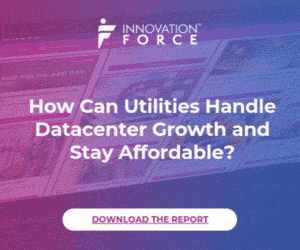While many utilities struggle with the question of whether or not to build a Smart Grid, for the Electric Power Board (EPB) in Chattanooga, Tennessee, it was never an issue. The big question for Chattanooga’s municipal utility was how to make its investment ensure far greater advantages than simply automating meter readings. EPB sought a solution that not only benefited the utility, but more importantly delivered ever-growing value to the community by improving quality of life and opening up economic opportunities. It took ten years for EPB to formulate its plans – and it took ten years for technology to catch up to its vision. But the city’s decision to simultaneously deploy the country’s most powerful fiber-optic network set a new standard for how a utility can lead the way toward a bright economic future while improving power quality, reliability, customer service and energy efficiency.
Chattanooga: The Smarter City
EPB is one of the first community-owned utilities to install a 100% fiber-optic network, which uses the fiber optic network for Smart Grid applications, in addition to the triple-play media services (i.e., high speed Internet, video and telephone) EPB already provides.
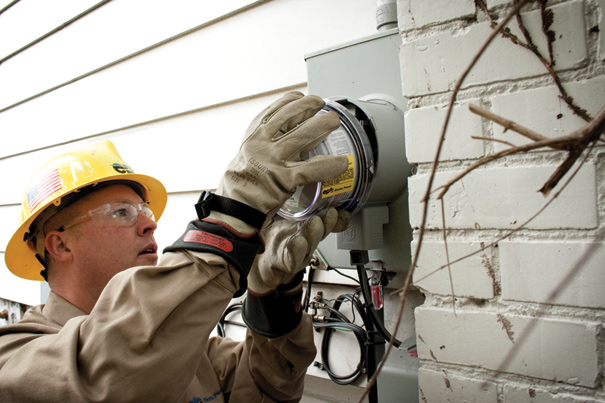
EPB technician deploys smart meter at customer home
Photos courtesy of EPB
David Wade, EPB’s Executive Vice President and COO, says that “The broadband communications network will enable EPB’s electric system to be intelligent, interactive, and self-healing – helping us to reduce customer outage minutes by 40%, provide our customers with the at-home tools and resources that will allow them to manage their energy use, increase power quality and much more.”
Virtually unlimited bandwidth gives EPB lightning-fast, two-way communications with every device in its distribution system. While a network this robust is overkill for metering, EPB realized that fiber is essential for tightly coordinated load shedding activities, for the split second responsiveness required in distribution automation and, for a virtual real-time energy management tool for customers.
EPB BRIEF
- City of Chattanooga, TN
- 170,000 residential and business customers; 600 square mile service area
- Largest DOE ARRA stimulus grant recipient for municipal utility; $111.5 million to accelerate project; largest grant amount per capita.
- 1 Gigabit Internet offering to both residential and business customers; fastest in the U.S.
- Tennessee Valley Authority distributor
Chattanooga built the network to ensure a true Smart Grid as well as empower the community in new ways.
For instance, because bandwidth is no problem, EPB is able to offer its customers simultaneous Internet upload and download speeds of up to 1 gigabit – 200 times faster than the current national average and ten times faster than the FCC’s National Broadband Plan (a decade ahead of schedule). This is just one example of how EPB’s 100% fiber-optic network will provide countless benefits for the community in terms of education, healthcare, economic development, quality of life and more.
With virtually limitless data capacity, EPB’s network will not become congested as millions of smart meters and smart appliances join the network and as data-intensive communications with these devices becomes more frequent.
Wade added: “The frequency of data transactions is increasing by orders of magnitude. Fiber-optic communications ensures that our network is prepared for anything the future has to offer. This way we can be certain that network efficiency will not diminish as traffic skyrockets. In addition to a high capacity, low latency backbone network, it’s equally important that there are no congestion points on the local area network.”
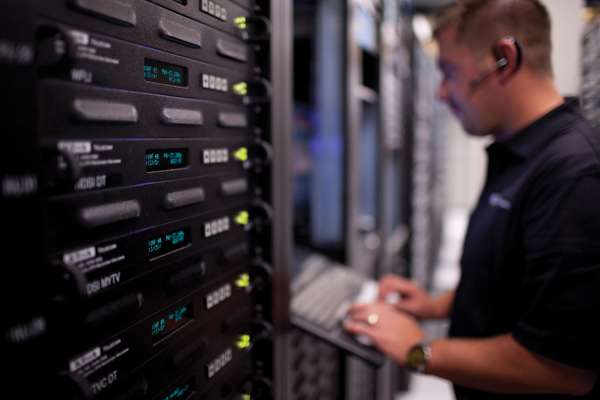
EPB Operations Center – built to handle the massive
amounts of data generated by the smart grid
The network is designed so that data moves efficiently between the utility and every endpoint, regardless of whether or not a premise is connected directly to the fiber-optic network. This configuration ensures a smooth transition to implementing the energy efficiency initiatives proposed by the TVA (Tennessee Valley Authority) such as time-of-use pricing, load shedding, customer signaling and advanced distribution automation applications become more prevalent.
“Chattanooga is light years ahead when it comes to providing ultra fast broadband,” said Tom Edd Wilson, President and CEO of the Chattanooga Area Chamber of Commerce. “By offering the fastest available speeds to a whole community comprising a diverse population living in both urban and rural areas, Chattanooga has become the living laboratory for today’s innovations and tomorrow’s companies.”
EPB has built fiber optics throughout their entire customer service area and communications services are now available to all homes and businesses. By the end of 2012, all 170,000 homes and businesses will be equipped with a Tantalus smart meter. Although building the network is the first step, the Smart Grid, not TV, Internet and phone services, drove the business case. It was clear this technology was the key to increasing reliability and managing energy costs well into the future.
The U.S. Department of Energy (DOE) also saw the benefits and awarded EPB a $111.5 million stimulus grant so it could fast track the project.
Both the Smart Grid and communications benefits of a 100% fiber optic infrastructure is paying off by attracting new business, like Volkswagen’s new North American manufacturing headquarters and an Amazon distribution plant.
Chattanooga will also be a test bed for Electric Vehicles (EV), with the Tantalus network providing the means through which 300 street-side charging stations will be monitored. During peak conditions, EPB can avoid overloading transformers by defer charging until the evening. On the other hand, the network can be used to measure how much power is being withdrawn from EV batteries if EPB needs to access energy stored in car batteries.
While discussion about the Smart Grid centers on how homeowners can better manage consumption and mitigate cost, EPB sees local industries as having the most to gain. Access to reliable, low cost power is essential.
“Everybody thinks about what smart metering means to residential customers,” Harold DePriest, EPB’s President & CEO, told MarketWatch last October. “But the real benefit of the Smart Grid will be the impact it has on businesses.”
He added that EPB already has 22 large industries signed up for a time-of-use (TOU) rate program, and its projected that together they will save $2.3 million a year. Those kinds of savings help businesses run more efficiently and bring jobs to the community.
High bandwidth and low cost reliable power are two things that can make a community more attractive to industries looking to relocate. DePriest pointed to the savings that can be achieved just by reducing outages. “By installing intelligent switches, we can reduce outage duration by 40% on average,” DePriest said. “Most of these savings can be accounted for because with the upgraded switching scheme, businesses don’t suffer nearly the degree of productivity loss that would otherwise result from a prolonged power outage.”
When time-of-use prices are in effect, manufacturers can reschedule or re-sequence operations to periods when energy is the cheapest. Furthermore, the ability to optimize power quality benefits the manufacturing process by minimizing the impact caused by minor fluctuations in voltage or frequency, which once disrupted highly sensitive manufacturing equipment.
Future Friendly Network
ADVANTAGES
- Network leverages EPB’s fiber-optic investment for triple play media and enhanced Smart Grid functionality
- One of the first cities to implement municipally-owned 100% fiber-optic network; economic driver for the region and opportunity to improve energy efficiency
- Fiber-optic network supports simultaneous upload and download of up to 1 Gigabit
- Fast, low cost deployment of 1500 smart meters per week; self-configuring, selfhealing network streamlines smart meter implementation and subsequent upgrades
- Helps industry become more efficient; TOU pricing expected to result in savings of $2.3 million a year for 22 manufacturers involved in time-of-use rate pilot
- Anticipates 40% in outage reductions resulting from improved distribution system management and intelligent switch technology
- Easy scalability; can support communications with the millions of data points expected to be on the network by 2012, including meters, demand response devices (i.e., smart thermostats & load control devices), distribution equipment and smart appliances
EPB doesn’t expect to be in the pole position as the country’s fastest broadband city for too much longer. Other communities across the country are in the process of building out Gigabit networks. But it’s really a global race, with a handful of other cities around the world boasting lightning fast broadband service.
“What makes Chattanooga stand out is that it is leveraging the network both for a full range of Smart Grid applications and communications connectivity,” Wade added.
“We looked at how the communication system and the electric system interact for many years and realized how closely tied together they are. As costs have stabilized and technology matured, we felt that the time was right to proceed with the project.”
“We’re building this network not just for today but for the future. The system we’re building will provide rapid, two-way communications with every meter, home and device, making it possible and practical for our customers to interact with their energy use as never before.”
He predicts that some customers will likely only want to know what their monthly usage is. For others – particularly businesses – it will change the way they use and value energy. Easy access to detailed energy profiles can help them determine whether everything is running efficiently and help them discover new ways to operate more cost effectively.
“Innovation is at the heart of everything we’re doing here in Chattanooga,” Wade continued. “We are driven to opening up new opportunities for people to manage their own energy use. Our 100% fiber-optic network will serve as a platform for accelerated innovation, job creation and deep creativity while serving as the backbone for the next generation of energy efficiency. All in all, with this infrastructure, we can’t even imagine today what will be possible in the future – but we will be ready.”
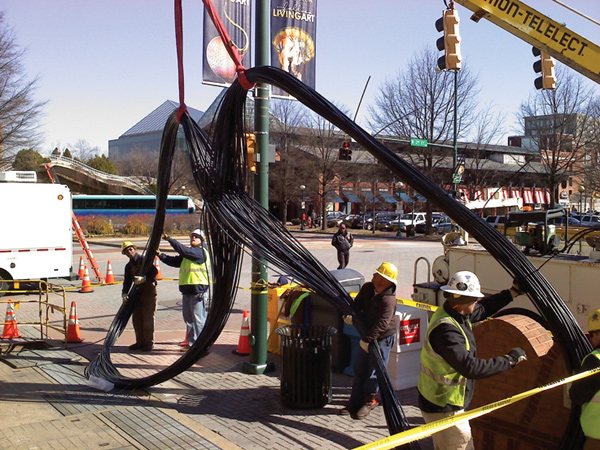
Fiber pull down in Chattanooga. EPB is building a lightning-fast, two-way fiber-optic
network that will provide communications with every device in its distribution system.
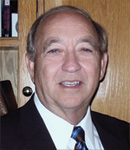
Lee Baker is an industry consultant on Smart Grid systems with more than 39 years of utility experience, including 16 years as the general manager of a Tennessee municipal electric and water utility.




